Topic: ENACTS
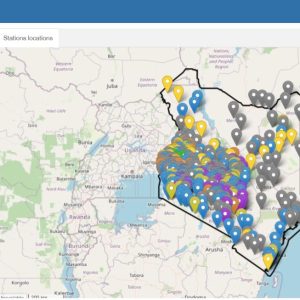
Digital innovation harnesses power of real-time weather data
Written by Amanda Grossi and Francesco Fiondella This story is adapted from one originally published by Accelerating Impacts of CGIAR Climate Research for Africa (AICCRA). A new data-management and visualization tool developed at IRI is helping national meteorological services and regional climate centers across Africa harness real-time weather data for decision-making in agriculture. National meteorological […]
Improving Availability, Access and Use of Climate Information
Author(s):
Combined Use of Satellite Estimates and Raingauge Observations to Produce High-Quality Historical Rainfall Time Series Over Ethiopia
Author(s):
Chapter 7: Challenges with Availability and Quality of Climate Data in Africa
Author(s):
Transforming Access to and Use of Climate Information Products Derived from Remote Sensing and In Situ Observations
Author(s):
Enhancing National Climate Services: How Systems Thinking Can Accelerate Locally-Led Adaptation
Author(s):
ENACTS: Advancing Climate Services Across Africa
Author(s):
The Climate Data Tool: Enhancing Climate Services Across Africa
Author(s):
Enhancing national climate services: How systems thinking can accelerate locally led adaptation
Author(s):

Colombia, Guatemala adopt ENACTS Climate Data Initiative
The Adapting Agriculture to Climate Today, for Tomorrow Columbia World Project is working with the governments of Colombia and Guatemala to implement a climate data initiative called Enhancing National Climate Services, or ENACTS, to help them better integrate climate knowledge into national-level planning and policy. Since 2014, ENACTS has helped countries facilitate the integration of […]
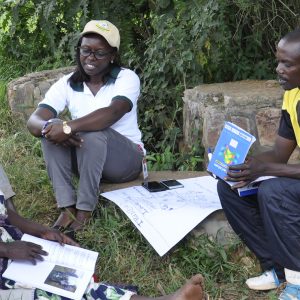
Q&A: Gloriose Nsengiyumva on Building Farmer-Inclusive Climate Services
Seasonal climate forecasts can help farmers stave off poverty and hunger. Nsengiyumva helps farmers in Africa interpret those forecasts and helps bring them into the design and development process of new climate services.
ENACTS Climate Services Initiative Ripples Across East Africa with WISER Support
Somalia, South Sudan and a number of other East African countries are now developing their own powerful climate analysis and visualization tools for decision making, using the Enhancing National Climate Services (ENACTS) approach. These efforts were made possible through a partnership with the Kenya-based IGAD Climate Prediction and Application Center (ICPAC) and with funding from […]

IRI@AGU: Schedule of Events 2019
A range of IRI’s areas of expertise will be represented at this year’s annual meeting of the American Geophysical Union (AGU). Below is the schedule of IRI’s posters and presentations in sequential order. SUNDAY, DECEMBER 8 World Climate Research Programme 40th Anniversary Symposium Lisa Goddard WCRP is celebrating its 40th year of international climate science. We […]
Launching Digital Agro-Climate Advisory Platform in Ethiopia
— The Reporter Ethiopia
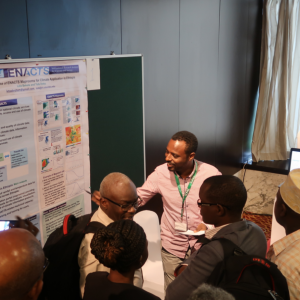
ENACTS Steals the Show at East Africa’s Largest Climate Event
The 53rd annual Greater Horn of Africa Climate Outlook Forum (GHACOF) took place in Dar Es Salaam, Tanzania this past August 26th – August 29th. The IGAD Climate Prediction and Applications Center (ICPAC) and the Tanzanian Meteorological Agency organized three days of discussion and useful presentations with the theme “Early Warning for Early Action in […]
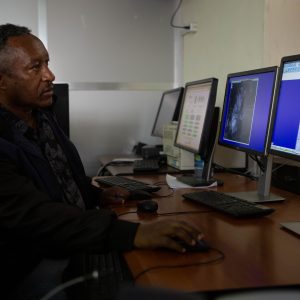
Trainings in Two ACToday Countries Pave the Way for More Knowledge-Sharing
The Adapting Agriculture to Climate Today, for Tomorrow (ACToday) project, is the first Columbia World Project. Led by the International Research Institute for Climate and Society (IRI), ACToday aims to combat hunger and improve food security by increasing climate knowledge in six countries that are particularly dependent on agriculture and vulnerable to the effects of […]
ENACTS Climate Data Initiative Officially Launches in Bangladesh
— ICCCD
National climate service to improve quality of information
— Guyana Ministry of Agriculture
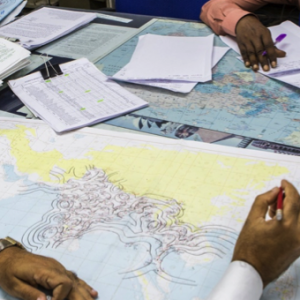
Climate Data Initiative Begins Work on a New Continent
This year, after a decade of operating solely in Africa, the ENACTS initiative is expanding to Bangladesh. This expansion is part of ACToday, a Columbia World Project that applies climate research to efforts to improve food security and nutrition in six countries around the world, including Bangladesh. ENACTS, which stands for Enhancing National Climate Services, […]
FEATURE: Climate information to help combat malaria in Ethiopia
— ReliefWeb
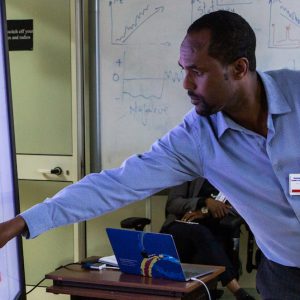
Training the Agents of Change: A New Approach to Reach Ethiopia’s Climate-Vulnerable Farmers
Driving on a new, six-lane expressway, it takes about an hour and a half to get from Ethiopia’s capital, Addis Ababa, to the city of Adama, about 60 miles to the southeast. Around 300,000 of Ethiopia’s 100 million people live in Adama, and at its center it feels just as bustling as the nearby capital, […]
Climate data matters
— Dhaka Tribune

IRI@AGU: Schedule of Events 2018
A range of IRI’s areas of expertise will be represented at this year’s annual meeting of the American Geophysical Union (AGU). Below is the schedule of IRI’s posters and presentations in sequential order. MONDAY Climate Services Research and Development: Adapting to Climate Today Lisa M Goddard is the primary convener for both a presentation and poster […]
Improving Availability, Access To and Use Of Climate Information in Ethiopia
Workshop for developing expertise in data and digital solutions to support smallholder farmers in Ethiopia. By Ravina Pattni and Kelly Ward This post originally appeared on the blog of the CGIAR Research Program on Climate Change, Agriculture and Food Security (CCAFS). Climate change is threatening farmers’ livelihoods in Ethiopia. Climate information services are a critical […]
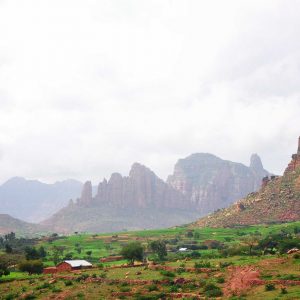
Ethiopia Establishes National Framework for Climate Services
Ethiopia’s economy and the well-being of its people varies, in part, with the climate. Natural climate variability and long-term climate trends both contribute to fluctuations in weather that affect operations in water resources, agriculture, energy, health and more. Periodic droughts continue to cause hunger. Rising temperatures are exposing more people to malaria. But our ability […]
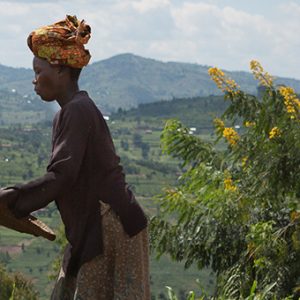
2018 Climate-Smart Agriculture Project of the Year
The project transforms Rwanda’s rural communities and economy through climate information and historic data reconstruction. The Rwanda Climate Services for Agriculture project has won the first Climate Smart Agriculture Project of the Year Award. The Aid & International Development Forum announced the news at its Africa Climate Smart Agriculture Summit in Nairobi earlier this week. The Rwanda […]
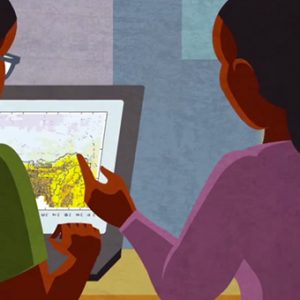
The Big Idea: Farsighted Forecasts
Lisa Goddard directs Columbia’s International Research Institute for Climate and Society (IRI), which helps developing countries anticipate and manage the impacts of climate change. Columbia Magazine asked her to explain how climate scientists can predict weather patterns months in advance, and how their work is improving people’s lives. Columbia Magazine: IRI is at the forefront […]
Enhancing National Climate Services (ENACTS) for Development in Africa
Author(s):
CSRD Technical Exchange: ICPAC and National Climate Maprooms – Existing and New Tools for Drought Monitoring and Forecasting in Eastern Africa
Author(s):
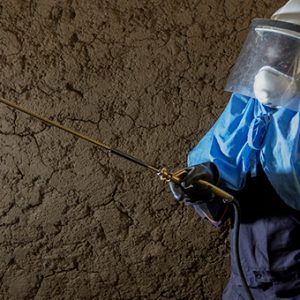
Evaluating the Impact of Malaria Control Programs in Africa
Studies Show that Malaria Interventions are Critical Investments for Saving Lives in Africa New studies released today in a special supplement of the American Journal of Tropical Medicine and Hygiene add to the evidence that over the last decade, global malaria control efforts have saved millions of children’s lives in areas most affected by malaria. […]
Climate mapping tools support resilient development in East Africa
Yohana Tesfamariam Tekeste reports from a workshop on climate resilient development held in August in Zanzibar. In 2005, the International Research Institute for Climate and Society published its assessment of key gaps in the use of climate information for health, agriculture, water and other sectors in countries across Africa. The results from the report were […]
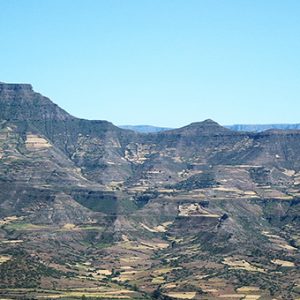
Malaria risk increases in Ethiopian highlands as temperatures climb
The highlands of Ethiopia are home to the majority of the country’s population, the cooler climate serving as a natural buffer against malaria transmission. New data now show that increasing temperatures over the past 35 years are eroding this buffer, allowing conditions more favorable for malaria to begin climbing into highland areas. That is the […]
ENACTS Maprooms for Malaria Control
Climate data and tools for malaria control in Africa – the ENACTS initiative By Madeleine Thomson Public health policy makers and practitioners are increasingly concerned about the impact that climate, environmental and social changes might have on the effectiveness of current and future vector-borne disease control and elimination programs. Yet, while climate change adaptation programs […]
Online tool aids resilience to climate change impacts
— SciDev.Net
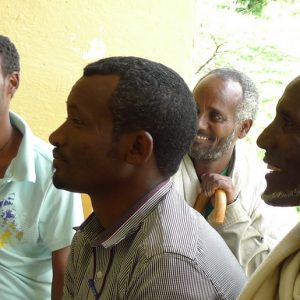
New Climate Data Transforms Insurance Projects in Africa
By Dan Osgood, Lead Scientist, IRI Financial Instruments Sector Team Small farms are vulnerable to climate risk, but most smallholder farmers around the world don’t have access to insurance and other financial tools to manage fluctuations in climate. Over the past decade we’ve put a great deal of effort into a new kind of insurance–index insurance–that […]
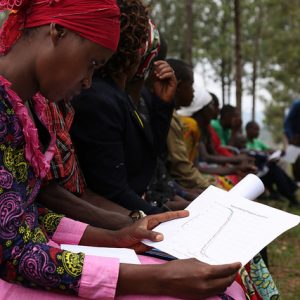
World Met Day: Partnering with national meteorological services to support farmers in Africa
The below is an excerpt from a blog written by IRI staff members James Hansen, Alison Rose and Dannie Dinh and originally appearing on the CCAFS website. On World Meteorological Day, we highlight how CCAFS and partners are supporting national meteorological services in African countries to provide actionable local climate information to farmers. The important contributions […]
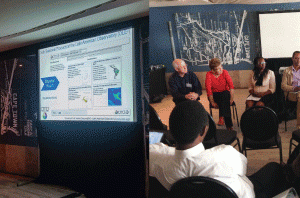
IRI Scientists Present At Climate Services Conference
In late February, seven staff members and scientists from the International Research Institute for Climate and Society participated in the fifth International Conference on Climate Services. The conference, held in Cape Town, South Africa, focused on capacity development, including elements of formal and non-formal education, infrastructure and institutional capacity, as well as other components of […]
Local beats global when it comes to national climate services in Rwanda
By Dannie Dinh, James Hansen, Floribert Vuguziga, Madeleine Thomson, Yohana Tekeste, and Aisha Owusu This post originally appeared on the web site of the CGIAR Research Program on Climate, Agriculture and Food Security. Climate data gaps are an obstacle to providing useful services for smallholder farmers Climate information—and its use for farming decision making, index-based […]
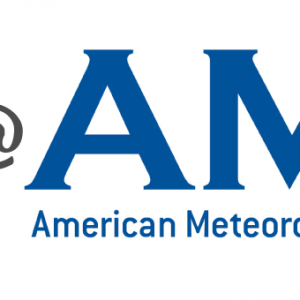
IRI @ AMS: Schedule of Events
“Observations Lead the Way” is the theme for the upcoming 97th annual meeting of the American Meteorological Society. Much, if not all, of the initiatives at the International Research Institute for Climate and Society rely on a critical mass of quality weather and climate observations. The presentations of IRI’s staff and scientists at this year’s […]
Meteo agency launches online webpage
— Graphics Online
25,000 Insured Ethiopian Farmers Receive Payments for El Niño Droughts
By Daniel Osgood More than 25,000 insured farming families in Ethiopia have received payments for crop loss and damages after a year of devastating drought caused in large part by the 2015 El Niño. The farmers purchased the insurance through the R4 Rural Resilience Initiative [latest report], run by the World Food Program and Oxfam America. […]
Turns Out You Do Need A Weatherman To Know Which Way The Wind Blew
— WBFO
Turns Out You Do Need A Weatherman To Know Which Way The Wind Blew
— NPR
Transforming Climate Services in Africa One Country at a Time
This post originally appeared on the World Policy Institute website. Ten million people in Ethiopia are considered food insecure due to the onset of drought in 2015. From Lesotho to the Sahel, African countries are grappling with the medium- and long-term impacts that climate change will have on their people, economies, and politics. However, even […]
UNDP initiative to help improve weather info access to African farmers
— Xinhua
UNDP Climate Action Hackathon a success
— Zambian Eye
Climate data is critical for development
— New Times
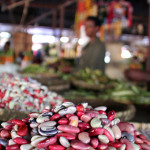
New Climate Services Program in Rwanda Aims to Reach One Million Farmers
The Rwanda Climate Services for Agriculture project, officially launched on #WorldMetDay 2016, will benefit nearly one million farmers over the next three years and reshape national food-security planning for the long term. (Kigali, Rwanda) 23 March 2016. To build a more climate-resilient agriculture sector, the Rwandan government and partners are taking action to provide nearly […]
The ENACTS Approach
— World Policy Institute
Huffington Post The ENACTS Approach: Data at the Front Lines of Africa’s Climate Crisis
— World Policy Institute
IRI@AMS 2016: Schedule of Events
From crowd-sourcing tornado data to teaching Harlem high-school students about climate change and climate justice, IRI scientists will be sharing a number of fascinating projects at the annual meeting of the American Meteorological Society (AMS) next week in New Orleans. Below is a schedule of their presentations and posters. Presenting authors appear in bold. Crowd-Sourcing the Storm: A New […]
Indonesia’s Fires Are Driving Climate, Public Health Crises
— Climate Central
Hellish fire season in Indonesia poses regional health and emission problems
— ClimateWire
Climate Data Can be Critical in Fragile and Conflict-Affected States – Here’s How to Get It
— New Security Beat
Leveraging the Climate for Improved Malaria Control in Tanzania
Author(s):
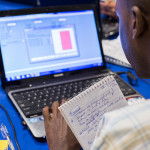
#WorldMetDay: Climate Knowledge for Climate Action
Today is World Meteorological Day, this year themed Climate Knowledge for Climate Action. Since this is basically the name of our game here at the International Research Institute for Climate and Society, we thought we’d share some of our recent, related activities. Working with the World Meteorological Organization Earlier this month, Rupa Kumar Kolli, Chief of the World […]
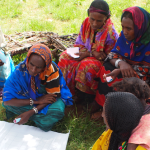
Boosting Climate Resilience in Africa Through Improved Climate Services
By Katherine Peinhardt The International Research Institute for Climate and Society is hosting a side event on improving data availability, access and use at the Third African Ministerial Conference on Meteorology (AMCOMET) conference, a high-level meeting of ministers and heads of meteorological services in Africa, which takes place in Cape Verde, from February 10-14, 2015. […]

Data for Malaria Decision Making in Africa
Earlier this year, the International Research Institute for Climate and Society and Columbia Global Centers | Africa supported a two-day meeting of the Roll Back Malaria Partnership in Dar es Salaam, Tanzania called “Strengthening National Climate Data and Information for Malaria Decision Making in Africa”. The meeting, held August 4-5, provided an overview of existing […]
Bridging Critical Gaps in Climate Services and Applications in Africa
Author(s):
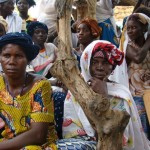
Involving Users in the Creation of Climate Information Products
By Tufa Dinku A recent workshop built capacity to use new climate information tools in West Africa. Agricultural practitioners are seeking to build resilience to climate variability and change while maximizing the benefits from favorable climate conditions. Decision-relevant climate information at different levels is critical to this ability, and involving users in the creation of […]
A model for improving climate services in Africa
In developed countries, we are accustomed to having access to long and detailed records on weather and climate conditions, demographics, disease incidence and many other types of data. Decision makers use this information for a variety of societal benefits: they spot trends, fine-tune public health systems and optimize crop yields, for example. Researchers use it […]

You must be logged in to post a comment.